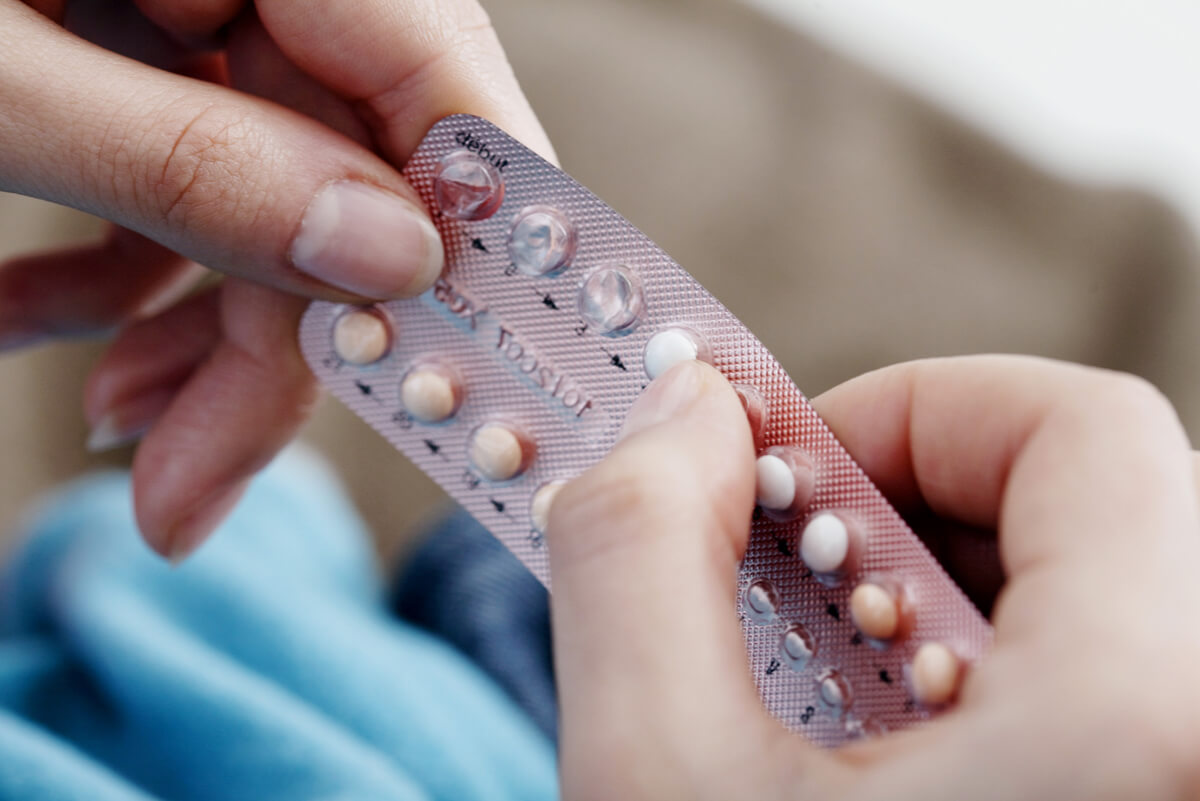Contraceptives and High Blood Pressure: How Are They Related?

Oral contraceptives are one of the most used methods by women to prevent pregnancy and promote regular menstruation. Its intake is associated with a variety of adverse effects, such as weight gain, acne, nausea, headaches, and bloating. Along with this, they can also encourage the development of high blood pressure. Let’s have a look at the link between contraceptives and high blood pressure.
The World Health Organization (WHO) estimates that one in five women suffers. or will suffer, from hypertension. It’s a chronic disease that, if not treated properly, can lead to heart, kidney, and cerebrovascular complications. Today we’ll tell you what’s known about the use of contraceptives and high blood pressure.
Contraceptives and high blood pressure

Some research indicates that the risk of developing high blood pressure from contraceptive intake is around 5%. The causes of this relationship haven’t yet been determined, but it’s believed that it may be due to the physiological changes generated by the increase in progestin and estrogens after ingestion.
This would explain, at least partially, why the increase in blood pressure due to contraceptives is greater when it comes to combined pills (those that use both hormones, and not just one).
Although there isn’t too much research into this in the last two decades, the hypotheses confirm that the use of contraceptives carries an increased risk of developing hypertension.
For example, research published in 2004 in the Journal of Human Hypertension indicated that elevated blood pressure values were controlled in hypertensive patients with discontinuation of the contraceptive pill.
A year earlier, in 2003, a study was published in Contraception that spoke about the risk of increased blood pressure in women taking oral contraceptives. Evidence suggested, regardless of age, weight, or possible hypertensive treatment, that the pills can unbalance normal blood pressure values.
The risk of developing this vascular condition increases as the intake becomes more permanent. Although very rare, experts know that oral contraceptives can lead to malignant hypertension. This is a particularly dangerous variant due to the complications it usually generates in patients.
Recommendations on the use of contraceptives and hypertension
Despite all that we’ve mentioned, in general, the benefits of taking birth control pills outweigh the risks.
The evidence indicates that complications only occur in a small percentage group, and that, combined with a healthy life, the chances are even lower. Because of this, women who maintain a temporary intake should consider the following:
- Get regular exercise. The WHO recommends at least 15 minutes of aerobic activity a week.
- Reduce the consumption of alcohol.
- Avoid tobacco intake (also passively) and episodes of stress.
- Eat a balanced diet with an emphasis on fruits, grains, and vegetables.
- Reduce your sodium intake.
- Keep a healthy weight.
If you include this in your routine, you’ll be tilting the balance in your favor. As a complement, you should monitor your blood pressure values on a regular basis. Remember that this condition doesn’t always develop symptoms and some of them, such as headaches or dizziness, can be confused with other episodes.
Other recommendations

If you detect any type of imbalance pattern, consult with your specialist to assess the possibility of changing the type of medication. For example, your doctor may recommend the use of pills that only have a hormonal component. These are called minipills and are safe against high voltage frames.
In addition to this, you must bear in mind your possible genetic predisposition. If your mother, father, or grandparents are hypertensive, then you’re more likely to be so as well. This, in turn, increases the chances of developing it through the intake of oral contraceptives.
If you don’t want to risk using them, you can also try other methods of birth control. In any case, remember that the relationship between contraceptives and high blood pressure isn’t great enough to stop taking the drug.
Its use is endorsed by the Food and Drug Administration (FDA) and the European Medicines Agency (EMA). If you decide to do without them, you’re at risk of becoming pregnant.
Oral contraceptives are one of the most used methods by women to prevent pregnancy and promote regular menstruation. Its intake is associated with a variety of adverse effects, such as weight gain, acne, nausea, headaches, and bloating. Along with this, they can also encourage the development of high blood pressure. Let’s have a look at the link between contraceptives and high blood pressure.
The World Health Organization (WHO) estimates that one in five women suffers. or will suffer, from hypertension. It’s a chronic disease that, if not treated properly, can lead to heart, kidney, and cerebrovascular complications. Today we’ll tell you what’s known about the use of contraceptives and high blood pressure.
Contraceptives and high blood pressure

Some research indicates that the risk of developing high blood pressure from contraceptive intake is around 5%. The causes of this relationship haven’t yet been determined, but it’s believed that it may be due to the physiological changes generated by the increase in progestin and estrogens after ingestion.
This would explain, at least partially, why the increase in blood pressure due to contraceptives is greater when it comes to combined pills (those that use both hormones, and not just one).
Although there isn’t too much research into this in the last two decades, the hypotheses confirm that the use of contraceptives carries an increased risk of developing hypertension.
For example, research published in 2004 in the Journal of Human Hypertension indicated that elevated blood pressure values were controlled in hypertensive patients with discontinuation of the contraceptive pill.
A year earlier, in 2003, a study was published in Contraception that spoke about the risk of increased blood pressure in women taking oral contraceptives. Evidence suggested, regardless of age, weight, or possible hypertensive treatment, that the pills can unbalance normal blood pressure values.
The risk of developing this vascular condition increases as the intake becomes more permanent. Although very rare, experts know that oral contraceptives can lead to malignant hypertension. This is a particularly dangerous variant due to the complications it usually generates in patients.
Recommendations on the use of contraceptives and hypertension
Despite all that we’ve mentioned, in general, the benefits of taking birth control pills outweigh the risks.
The evidence indicates that complications only occur in a small percentage group, and that, combined with a healthy life, the chances are even lower. Because of this, women who maintain a temporary intake should consider the following:
- Get regular exercise. The WHO recommends at least 15 minutes of aerobic activity a week.
- Reduce the consumption of alcohol.
- Avoid tobacco intake (also passively) and episodes of stress.
- Eat a balanced diet with an emphasis on fruits, grains, and vegetables.
- Reduce your sodium intake.
- Keep a healthy weight.
If you include this in your routine, you’ll be tilting the balance in your favor. As a complement, you should monitor your blood pressure values on a regular basis. Remember that this condition doesn’t always develop symptoms and some of them, such as headaches or dizziness, can be confused with other episodes.
Other recommendations

If you detect any type of imbalance pattern, consult with your specialist to assess the possibility of changing the type of medication. For example, your doctor may recommend the use of pills that only have a hormonal component. These are called minipills and are safe against high voltage frames.
In addition to this, you must bear in mind your possible genetic predisposition. If your mother, father, or grandparents are hypertensive, then you’re more likely to be so as well. This, in turn, increases the chances of developing it through the intake of oral contraceptives.
If you don’t want to risk using them, you can also try other methods of birth control. In any case, remember that the relationship between contraceptives and high blood pressure isn’t great enough to stop taking the drug.
Its use is endorsed by the Food and Drug Administration (FDA) and the European Medicines Agency (EMA). If you decide to do without them, you’re at risk of becoming pregnant.
- Garza Flores, J., & Sierra-Ramírez, J. A. Anticonceptivos orales combinados y enfermedad cardiovascular. Perinatología y reproducción humana. 2006; 20(4): 98-111.
- Lubianca, J. N., Moreira, L. B., Gus, M., & Fuchs, F. D. Stopping oral contraceptives: an effective blood pressure-lowering intervention in women with hypertension. Journal of human hypertension. 2005; 19(6): 451-455.
- Lubianca, J. N., & Faccin, C. S. Oral contraceptives: a risk factor for uncontrolled blood pressure among hypertensive women. Contraception. 2003; 67(1): 19-24.
- Riera, M., Navas-Parejo, A., Gomez, M., & Cerezo, S. Hipertensión arterial maligna y fallo renal irreversible, asociado a toma de anticonceptivos orales. NEFROLOGIA. 2004; 24: 298-299.
- Woods, J. W. (1988). Oral contraceptives and hypertension. 1988; 11(3_pt_2), II11.
Este texto se ofrece únicamente con propósitos informativos y no reemplaza la consulta con un profesional. Ante dudas, consulta a tu especialista.







